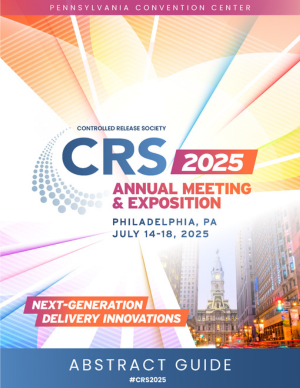Bioengineering
Tech Session I: Bioengineering I
Injectable devices as cell factory implants for therapeutic antibody production
Tuesday, July 15, 2025
11:16 AM - 11:27 AM EDT
Location: 119 A
Introduction: Antibodies have emerged as a leading biotherapeutic class, but their subcutaneous or intravenous administrations is limited by the rate of systemic clearance, necessitating frequent dosing which is inconvenient and costly for patients. A promising approach is the use of encapsulated recombinant cells as a viable source for continuous antibody production. We designed minimally invasive subcutaneous injectable devices to deliver antibody-producing cell factories for sustained antibody delivery from a fixed payload of cells. These macro devices prevent cell escape & can be safely removed.
Learning Objectives:
At the completion of this activity, participants will know
- Understand fabrication parameters contributing to encapsulation device porosity & Ab diffusion.
- Estimate the optimal cell loading density per device for maximum Ab daily productivity.
- Evaluate cell survival and antibody productivity under SC hypoxic & nutrient deplete conditions.
Daniel Bernards – Senior Scientist, University of California, San Francisco; Bhushan Kharbikar – Postdoctoral Fellow, University of California, San Francisco; Daria Smuk – Student, School of Engineering, Brown University; Brendan Knittle – Masters Student, School of Engineering, Brown University; Jean Jerome – PhD Student, School of engineering, Brown University; Akram Abassi – Postdoctoral Fellow, School of Engineering, Brown University; Meerab Aziz – student, School of Engineering, Brown University; Kareem Ebeid – Postdoctoral Fellow, School of Engineering, Brown University; Anthony Davis – PhD Student, Department of Bioengineering, Rice University; Omid Veiseh – Professor, Department of Bioengineering, Rice University; Tejal Desai – Dean of School of engineering, Brown University

Marwa Sallam, PhD (she/her/hers)
Senior Research scientist
school of Engineering, Brown University
Providence, Rhode Island, United States

